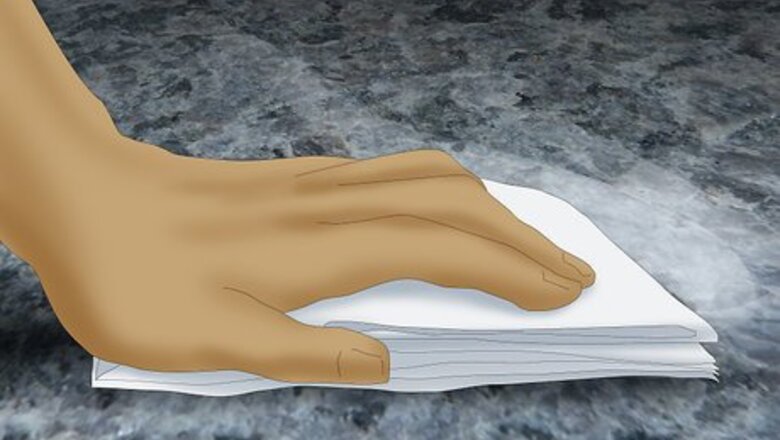
views
Cleaning Up Everyday Spills
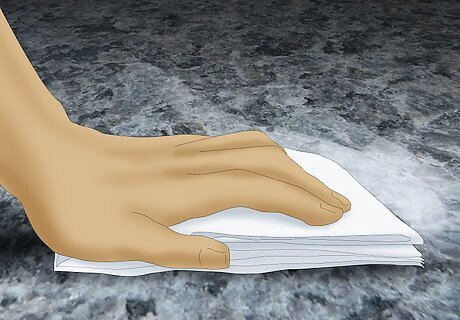
Wipe up spills when they happen. Like any surface, it's easiest to wipe up spills as you go. If you wait to wipe up the spill, it can dry on the surface, making it harder to clean. Since Corian countertops are nonporous, the spill won't soak in, making it a breeze to just wipe it up with a clean, damp cloth. Always dry the surface immediately after cleaning. If you don't dry the surface, film will build up over time.
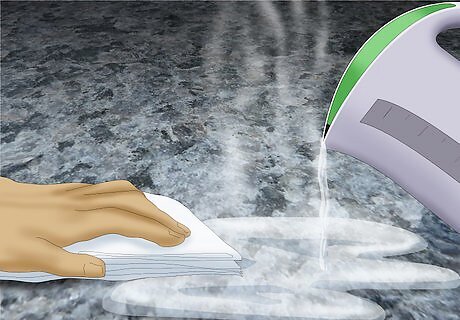
Use warm water and a dishcloth or sponge. If the spill has dried, you can use warm, soapy water to clean it up. Put a bit of dish soap on a rag, then add warm water to make it sudsy. Wipe it over the spill or residue to clean it up, then rinse it with clean warm water.
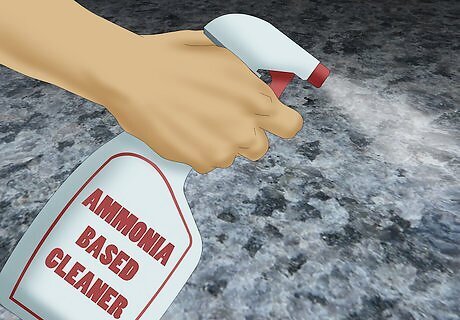
Try an ammonia-based cleaner. If regular soap and water don't remove the stain, you can use an ammonia-based cleaner. Spray or rub the cleaner in, then wipe it up. Make sure to rinse it with clean water, and don't forget to dry it so you don't leave streaks. Don't use window cleaners on this type of counter, as these can leave a waxy buildup. Before using any cleaner, read the directions on the bottle. Always test the cleaner first on an out-of-way corner, so you can rest assured it won't create a different problem. Although glass cleaner does have ammonia in it, you should skip it for this purpose. It can leave a film on the countertop. Pick a household cleaner instead.
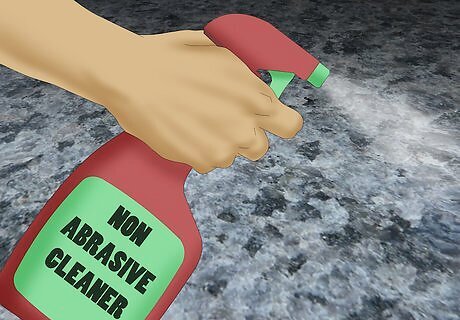
Pick another non-abrasive cleaner. If you don't have an ammonia-based cleaner, you can use another non-abrasive cleaner. It must be non-abrasive because Corian countertops are easily scratched. Spray the cleaner on the counter, and use a clean, wet rag to rub the cleaner in. You can leave the cleaner on for a minute or two to help remove the stain. Rinse and dry the countertop when you're done. Make sure not to mix different types of cleaners, as that can create toxic fumes.
Removing Stains
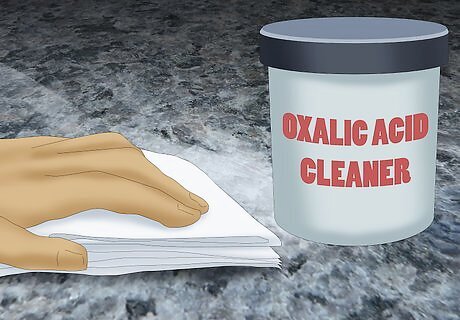
Use a cleaner with oxalic acid. Oxalic acid can help remove brown stains, particularly on white surfaces. You can find cleaners with oxalic acid at your local big box stores. Zud and Barkeepers Friend are two common stain removers with this ingredient. Just rub the cleaner in and leave it for a few minutes, then wipe it off, rinsing it with clean water. Don't forget to dry it afterward. You may need to repeat the process to get all of the stains.
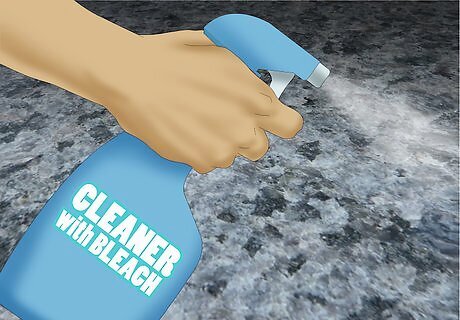
Try a cleaner with bleach. If you have white Corian counters, you can use a product that contains bleach. The material can withstand bleach, as long as you don't leave it on for more than 16 hours. You can also just use a mixture of bleach and water, but don't go any stronger than 50 percent bleach. You can leave the cleaner on the stain for a few minutes to help the cleaner penetrate. Wipe it up with clean water when you're done letting it soak. If your counters aren't white, it's possible that bleach could bleach out your countertops. Test it in an inconspicuous place if you want to use a cleaner with bleach on colorful counters.
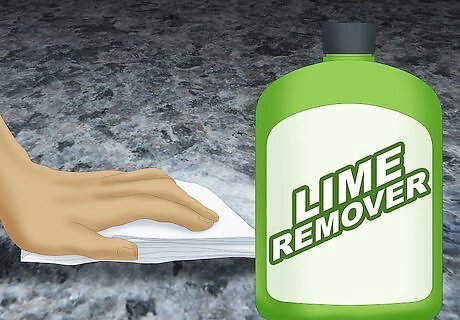
Remove hard water buildup with a lime remover. Limescale cleaners can help you remove hard water buildup. Generally, these cleaners are acidic to break down the limescale on the surface. To use this type of product, spray it on the counter before walking away for about 5 minutes. Wipe it down. Rinse and dry the counter. You may need to apply the cleaner more than once to remove all the limescale.
Keeping Your Counters Looking Nice
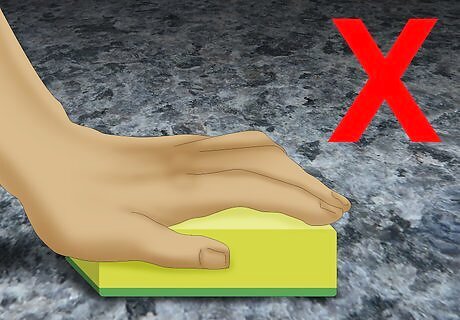
Skip abrasive scouring pads. You shouldn't use sponges that have an abrasive side (like the yellow and green scrubby sponges), at least on the abrasive side. In addition, you should skip steel wool or any other type of scratchy material. Anything too abrasive can scratch up your countertop.
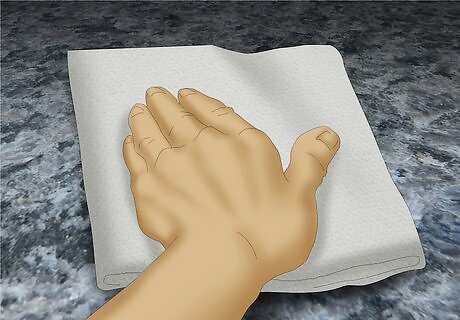
Use a microfiber cloth when cleaning. A microfiber cloth is best when scrubbing your countertop. It works well to remove stains, but it won't scratch the surface. You can find these cloths at big box stores, supermarkets, and even home improvement stores.
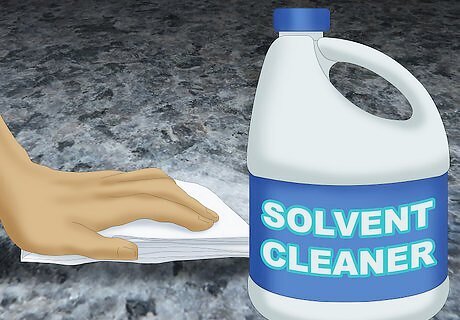
Don't use hard solvents or anything with acetone. Hard solvents, like drain cleaners, can cause serious damage to Corian surfaces. Similarly, acetone can also cause damage to the surface that you can't undo. If you spill nail polish on a Corian surface, you can remove it with nail polish remover; just be sure to pick one that doesn't have acetone in it. You should also try not to get other harsh chemicals, such as paint remover or oven cleaner, on your countertop, as those can also cause damage.
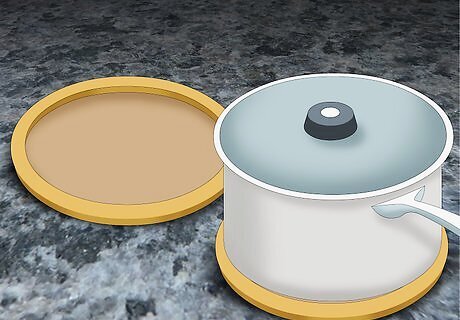
Protect it from heat. While Corian counter tops are heat resistant, it's still a good idea to protect them from heat. Always put trivets or other heat protection under hot pots that you place on the counter. It's also a good idea to put a trivet under something that produces heat, such as a toaster.
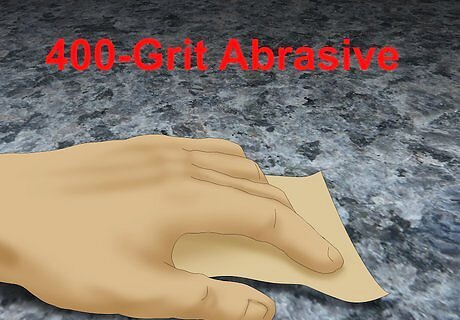
Buff out minor scratches. Corian counter tops have a tendency to get scratched, but you can take care of most minor scratches at home. The best tools are the abrasive pads put out by DuPont, which get progressively finer. However, you can also try something like Comet powder cleaner and a Scotch-Brite white pad. Fine-grit sandpaper may also work. It will need to be 400-grit wet-dry sandpaper. With the DuPont abrasive pads or sandpaper, clean the counter to remove any film, and leave it wet. Starting with the peach pad (or sandpaper), rub lightly in one direction over the scratch. Every once and a while, switch the direction you're rubbing perpendicularly. Run the pad under water to remove residue as you go. Keep scrubbing until the scratch is removed. You may need to work over a large surface area or use finer abrasive pads to help it blend. With a Scotch-Brite pad, start with a clean, wet counter. Sprinkle on some Comet, and rub the scratch in circles. Next, move on to rubbing it the direction the scratch is going. Once again, you may need to work in a large area to blend in what you're sanding. For deeper scratches, you're going to need professional help.
















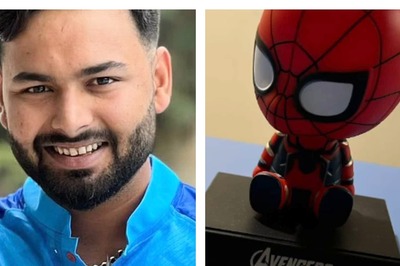



Comments
0 comment